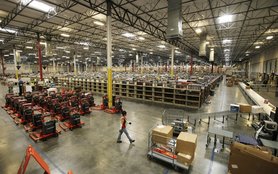Oxfam index finds voters overwhelmingly support laws improving workplace compensation and conditions, while no state mandates a living wage
BOSTON, MA- Ahead of Labor Day, anti-poverty organization Oxfam America has released a 2019 ranking and interactive map of state labor laws and worker protections, finding the District of Columbia and California top the list, while Virginia and Mississippi come in last.
The Best States to Work Index (BSWI) provides a measure of three policy areas: wage policies to ensure workers earn as close to a living wage as possible; worker protections so workers can take time off for sickness or pregnancy and have legal protections against sexual harassment; and policies to protect the rights of workers to find a voice through organizing and sustaining a trade union if they desire.
In the past few years, as Congress has dragged its feet on taking steps to improve labor laws at the federal level, most states have made vital and extremely popular moves to pass labor laws that support working families.
“Most voters and legislators believe that hard work should pay enough to sustain a worker and their family,” said Minor Sinclair, Oxfam America’s US Domestic Program Director. “As the federal minimum wage has been stuck at the poverty wage of $7.25 an hour for over a decade, many states and cities have made the move to increase the minimum within their borders.”
This past year, some electorates voted in defiance of conservative state legislatures, raising wages and overturning “right-to-work” laws. These changes have shifted rankings in Oxfam’s original state labor index of 2018. As a result, the current landscape for workers across the Unites States reflects a vast variety in conditions and compensation and indicates more clearly than ever that voters want improvements.
Two significant changes that were a direct result of voters taking action to defy the state legislature took place in Missouri, which jumped up from No. 37 to No. 26. First, in August 2018, a majority of the electorate voted to strike down the state’s “right-to-work” law, which was passed by the legislature in 2017. Second, in November 2018, voters passed Proposition B, to raise the minimum wage each year until it reaches $12 in 2023. For years, Republican lawmakers in Missouri had voted down proposals to raise the wage, including efforts by voters in St. Louis and Kansas City to enact their own minimum wage laws. While local control of minimum wages is vital to help workers keep up with higher costs of living, several states still preempt towns and cities from making their own laws.
Since the low-wage workforce is disproportionately weighted toward women and people of color, many state labor laws and worker protections help address longstanding inequities around gender and race. In DC, which ranks the highest, workers have protections regarding sexual harassment, accommodations for pregnancy and the right to pump, regulations on scheduling demands, and mandated paid sick and family leave. In Virginia, which ranks last, these protections simply do not exist.
“Working women especially need a fair shot. They need considerations when pregnant and breastfeeding, flexible schedules to accommodate childcare needs, paid sick leave, and much more,” said Mary Babic, Oxfam America US Domestic Program Manager. “Workers who have families, especially women and single parents, encounter dramatically different conditions in different states,” continued Babic. “We’re glad to see some states stepping up to make the workplace safer and more equitable. Now it’s time for the federal government to follow suit.”
While the top ten states remained the same as in the 2018 index, there was a shuffling of states in the rankings. California moved from No. 3 to No. 2, largely as a result of a dollar increase in its minimum wage (to $12). Washington dropped to a very close No. 3; the minimum wage in that state increased by only 50 cents. Of note, Maine jumped from No. 8 to No. 5 because its minimum wage increased by a dollar to $11, and due to new legislation regarding pregnant worker accommodation and salary history.
“In the end these laws are really about the worker who shows up on the job every day, works long hard hours trying to pay the bills and just maybe get ahead,” said Babic.
Oxfam recommends increasing minimum wages, improving worker protections such as equal pay laws, providing workplace protections for pregnant and breastfeeding workers, ensuring job-protected paid family and medical leave, guaranteeing paid sick days, protecting against sexual harassment, while repealing laws that undermine worker freedom to bargain collectively.
/ENDS
Note to editors: A nationwide map of the rankings with detailed data along with the full report is available here


